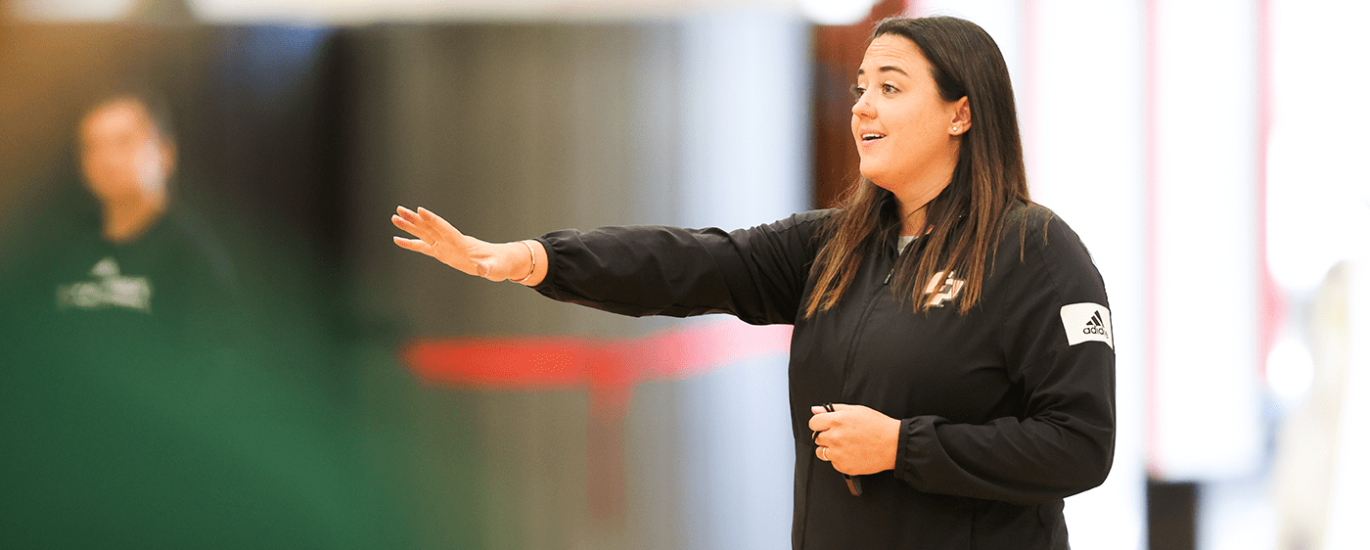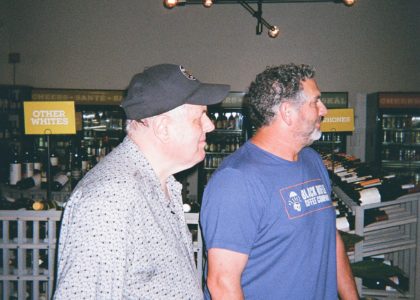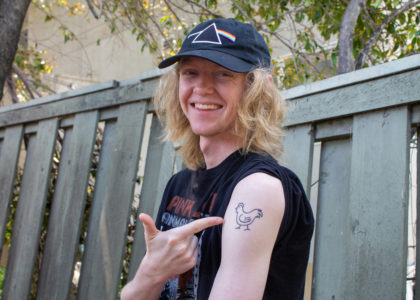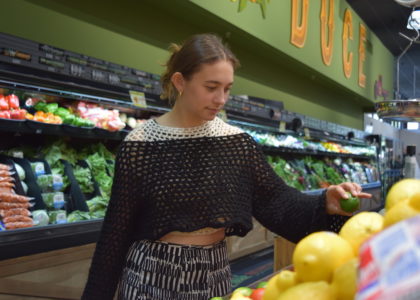By Diego Sandoval, Derek Righetti, Miles Berman
As the team celebrated, JJ Walters, the daughter of head coach Caroline Walters, ran across the court, jumping into her mother’s arms.
Cal Poly Volleyball had just pulled off an upset over the University of Hawaii on Saturday, Oct. 15, 2022, with a sold out crowd in attendance at Mott Athletics Center.
Embracing her daughter, Walters looked up at her wife in the stands and at the players on the court that she had come to love as daughters of her own, soaking in one of the biggest wins of her volleyball career.
“Volleyball has brought me everything,” Walters said. “It brought me relationships with players that I consider to be friends and not former players. … It’s brought me a sense of gratitude for the sport.”
Walters has now been Cal Poly Volleyball’s head coach since December 2018 and has been with the program for 14 years. In that time, the impact she has left on individual players and the program as a whole has transcended the sport she has played for her entire life.
Video by Diego Sandoval, Derek Righetti, Miles Berman
From Player to Coach: How She Got Here
After playing baseball and other sports growing up, Walters described her beginnings with volleyball as being in “the right place at the right time.”
Walters’ parents were close friends with Kerri Walsh Jennings, a three-time Olympic gold medalist in beach volleyball, who encouraged a 10-year-old Walters to get into volleyball.
Eight years later, Walters was the starting libero on a club team, filled with highly recruited players, that had made the national championship game twice in three seasons.
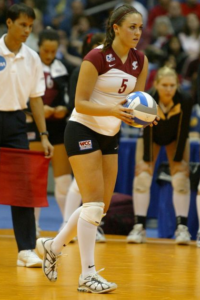
After being recruited herself, Walters opted to attend and play volleyball at her parents’ alma mater, Santa Clara University.
At Santa Clara, Walters was a three-time All-West Coast Conference Honorable Mention and set the school record in digs (1,932) and dig average (4.59). On top of her individual accomplishments, Walters and the Broncos reached the Final Four of the 2005 NCAA Championships, the best finish in program history.
“I’m really proud to be a part of that,” Walters said. “I wouldn’t trade it for the world. … It made me the competitive female that I am.”
Her competitiveness wasn’t the only thing she gained from her time as a collegiate volleyball star. According to Walters, Santa Clara was where she first realized that she could have a future as a coach.
“I saw the game very differently than my teammates in college,” Walters said. “I remember being in drills and responding, and [coaches] would say, ‘the game is slow for you.’ I was always calm and directing people.”
In 2009, after coaching a local club team out of college, Walters interviewed for an assistant coaching position at Cal Poly. She was 23 years old, and she got the job.
“After 14 years, looking back on that moment, I have to pinch myself,” Walters said. “It’s humbling to have been given that opportunity. This is not a job that you fall into that easily. … It feels like it all had a purpose.”
Two years into Walters being an assistant, the head coach was abruptly fired. At 24, she was named the interim head coach.
“It was baptism by fire,” Walters said. “Being 24 and not even having a true sense of what my style was … you’re still trying to find what you truly believe in and you can’t find that as a 24-year-old.”
Following that season, Cal Poly hired Sam Cross as head coach, and Walters returned to her role as an assistant coach. Walters kept that role until 2018, when she took over the reins of the program as the head coach herself.
“It’s been 14 years [since beginning coaching], and my coaching style has evolved and changed,” Walters said.
Where that coaching style has developed the most, according to Walters, comes off the court with her players.
“What I’ve evolutionized into my coaching style is that it’s all about these kids,” Walters said. “The wins and losses are great … but it’s all about them.”
Coaching off the Court: Maia Dvoracek
One of Walters’ players was Maia Dvoracek, a recent Cal Poly Volleyball graduate who is now playing professionally in Hungary.
After an All-American season in 2019, Dvoracek contemplated leaving school early to pursue her professional career. In early 2020, Walters and Dvoracek came together and, after some convincing by Walters, Dvoracek decided to finish out her Mustang career.
Shortly after, Dvoracek suffered a serious knee injury. Trainers feared that she would never walk again, Walters said.
However, Dvoracek and Walters had the same goal in mind: to get Dvoracek back on the court.
“I was really adamant that I was coming back to Cal Poly … to play for Caroline for one more season,” Dvoracek said.
It wasn’t that easy. Recovery required a year off the court, hours of physical therapy and time spent away from the team. It was during that period that the bond between coach and player went beyond the court.
“To see what she was able to do in her recovery … it’s a pride that goes beyond a player-coach relationship,” Walters said. “We have a relationship that will be long lasting. … She knows that I’ll do anything for her.”
Coping with a serious injury is challenging for any athlete, let alone one of Dvoracek’s pedigree and potential. The conversation between a coach and an injured star player is often about rushing the athlete back onto the court, but it wasn’t with Walters.
“Whenever [Caroline] asked how I was doing after the injury, it was always as a person,” Dvoracek said. “Obviously as a player, volleyball comes into it, but the biggest thing always was if I was genuinely okay as a person. Knowing that Caroline thought about that first was the biggest motivator.”
Ultimately, that relationship—paired with Dvoracek’s ability to “trust the process”—allowed Dvoracek to return to the floor in the fall of 2022 for her last season in the Green and Gold.
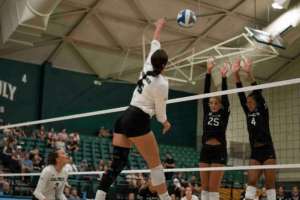
In that season, Dvoracek led the team in kills (406), points (510) and points per set (4.55) while starting all 30 games and played in all 112 sets, setting herself up for a contract overseas.
Putting the Person before the Player: Brooklyn Burns
While attempting to get Dvoracek back on the court, Walters also managed to nurture an incoming freshman who was dealing with an off-court battle for her life.
In February 2022, now-freshman setter Brooklyn Burns was diagnosed with Stage 2 Hodgkin’s Lymphoma, a type of cancer that impacts the lymphatic system. The summer before, Burns had committed to play volleyball for Walters at Cal Poly.
With her volleyball career put on hold, Burns had to face her fear of telling Walters and the coaching staff about her diagnosis.
“I was terrified to tell [them], because when you think of college volleyball, you hear of kids who go through injuries and things like that and they just get dropped,” Burns said.
Walters’ response came as a welcome surprise.
“I don’t think I’ve ever picked up a phone and called or texted someone that fast,” Walters said about when she heard about Burns’ diagnosis. “I said, ‘I don’t know physically what you’re going to do. … I don’t care. Girlfriend, you’re coming here.’”
It was this sentiment that reassured Burns that Cal Poly was the place for her and that Walters was different from most college coaches in the way that she cares for her players.
“What stuck out to me was that she really cared about the person that I was,” Burns said. “That was really different from other college coaches when they’re so focused on your skill and what you’re going to bring to the program volleyball-wise. With her, she just really wanted me here as a person.”
That support off the court continued for Burns when she got to San Luis Obispo in the summer of 2022.
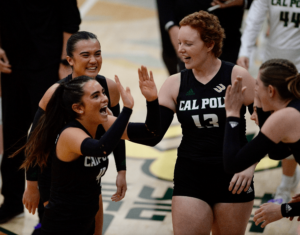
Not knowing whether or not Burns would be fully ready both physically and mentally to jump into collegiate volleyball, Walters made herself available for anything, from conversations after practices to joining her at doctor’s appointments.
“[Caroline] said, ‘You tell me what you need and I’ll be there,’” Burns said. “I started from the bottom, and I’m slowly working my way up there, and [Caroline] has been there for everything if I need anything.”
Her Lasting Impact on the Program
Dvoracek and Burns’ individual stories are just two examples of how Walters runs her program.
“My favorite thing in being involved [with coaching] is watching these kids come in as freshmen, then seeing how they leave as seniors,” Walters said. “I coach to make sure that they’re better [people] when they leave than when they got here.”
Assistant coach Jason Borchin, who has been with the program for six years, sees Walters as a “tremendous role model outside of volleyball in life” thanks to her mindset and philosophy.
“In the end, she cares about them more as people than as athletes,” Borchin said. “She’s been through it all and can help these girls through anything.”
Off the court, Walters’ position as a role model has even extended to her sexuality, as she is a member of the LGBTQ+ community and has had a player come out to her before.
“I’ve had one player come out to me, and it was a cool moment. … The coolest part was seeing how much more free and open she seemed after that, not just in conversations but physically playing on the court,” Walters said. “I wish I had that when I was playing. It would have been interesting to see if my play would have evolved.”
Both players and assistant coaches of Walters have made it clear that she is a successful head coach both due to her on-the-court experiences and her personability off the court.
“[Caroline’s] such a good coach because she’s such a good person,” Brooklyn Burns said. “She loves us like her own children and has brought us into her own family.”
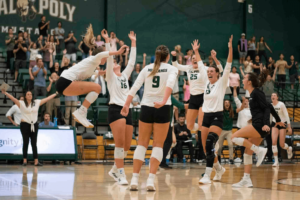
With all she has given to the sport, Walters said that “volleyball has brought me everything.”
Volleyball took Walters to Santa Clara, where she met her future wife and began a career that would eventually land her in San Luis Obispo. The sport gave her experiences with players and coaches along the way that would eventually shape her own coaching style.
However, perhaps above all else, volleyball has given Walters the opportunity to impact, care for and shape the lives of the young women that walk through Mott Athletics Center to play the sport they love.
“I always cared for my players,” Walters said. “But now it’s another vested level of care knowing that they are somebody’s daughter and they have people looking at them the way I get to look at my daughter running across the floor to me after a win.”
Feature Image Courtesy of Cal Poly Athletics


